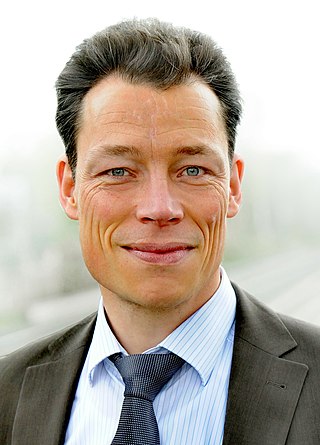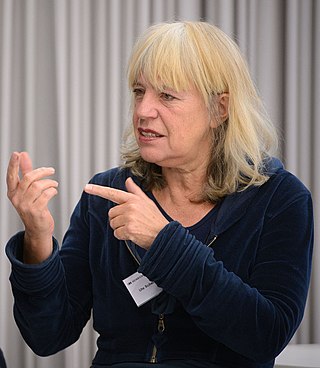Related Research Articles

Larissa-Antonia Marolt is an Austrian fashion model and actress. She was the winner of the first cycle of Austria's Next Topmodel. After her victory she also participated in the fourth season of Germany's Next Top Model, where she was placed eighth.

Sonja Sutter was a German film actress. She was one of the few actors that was allowed to appear in productions in both East and West Germany. She is remembered for her role as Fraulein Rottenmeier in the German TV series Heidi from 1978. This series aired in many countries in Europe during the 1980s and 1990s, and was dubbed into several languages. She is also remembered for having had several roles in the TV series Derrick from 1983 to 1998.

Nadja Maleh is an Austrian actress, singer, cabaret artist and director.

Ellen Schwiers was a German actress of stage, film, and television. She was featured in world premieres of plays by Dürrenmatt and Frisch at the Schauspielhaus Zürich, and appeared as Buhlschaft in Jedermann at the Salzburg Festival. In a career from 1949 to 2015, she also appeared in more than 200 films and television shows, including popular series such as Tatort. She also directed plays, founded a touring theatre company in 1982, and was Intendant of a festival from 1984.
Renate Holm was a German-Austrian film actress and operatic soprano. She worked as a dentists' assistant and took private singing lessons, resulting in performances in musical films and schlager. She made her debut at the Vienna Volksoper in 1957, and moved on to the Vienna State Opera where she worked for decades. She appeared internationally and made many recordings, especially for the WDR in a series of operettas with conductor Franz Marszalek. She later worked as a voice teacher, juror at competitions, and festival manager. Her memoir was published in 2017.
Götz Kauffmann was an Austrian stage, film and television actor, cabaret artist and writer.

Inge Maux is an Austrian actress.
Reinhard Schwabenitzky was an Austrian film director, producer and screenwriter.
Gertrud Fussenegger was an Austrian writer and a prolific author, especially of historical novels. Many commentators felt that her reputation never entirely escaped from the shadow cast by her enthusiasm, as a young woman, for National Socialism.

Katja Isabel Leikert is a German politician of the Christian Democratic Union (CDU) who has been serving as a member of the Bundestag since 2013, representing the Hanau electoral district. Within the CDU/CSU Bundestag Group, parliamentary colleagues elected her one of the alliance's eleven Bundestag deputy chairpersons in January 2018.

Herbert "Happi" Prikopa was an Austrian television presenter, conductor, operatic tenor, actor, composer, writer, pianist and cabaret artist.

Martin Wehrle is a German journalist, career advisor and non-fiction author. He is also known as an advocate of universal basic income (UBI).

Philipp Hochmair ; born 16 October 1973) is an Austrian theater, film and television actor.

Uta Bresan is a German schlager / folk singer and television presenter. Commentators pay tribute to her enduring versatility in both capacities.

Agnes Muthspiel was a Salzburg painter, representative of the "Salzburg Group" of artists that came to prominence during the 1950s.

Willi wills wissen was a children's program focused on factual issues and everyday occurrences, produced by Megaherz Film und Fernsehen on behalf of the Bayerischer Rundfunk with the Institut für Film und Bild in Wissenschaft und Unterricht. The program was first broadcast on KiKA from 2002 to 2010, and was regularly repeated on Das Erste and some regional channels of the ARD. The producers were Franz Xaver Gernstl and Fidelis Mager.

Ute Scheub is a German journalist-commentator, political analyst and author. A woman of robust intellect and powerful convictions, she is also sometimes identified as a campaigner.

Odysseus, Verbrecher. Schauspiel einer Heimkehr is a play by the Austrian writer Christoph Ransmayr, first performed in 2010. It is based on an episode toward the end of Homer's Odyssey, where Odysseus returns to his kingdom and slaughters his wife's suitors, who are called reformers in the play. Odysseus, Verbrecher was commissioned for the Ruhr.2010 campaign as one of six new plays based on the Odyssey.

Lydia Mischkulnig is an Austrian writer living in Vienna. The winner of the Bertelsmann-Literaturpreis writes mainly novels, narratives and radio plays.
References
- 1 2 Michaela Posch (22 March 2014). "Elfi Eschke freut sich Österreicherin zu sein". SALZBURG24 GmbH. Retrieved 5 April 2022.
- 1 2 3 Stefan Böttcher ("Filmeule"), Berlin. "Biografie von Elfi Eschke" . Retrieved 5 April 2022.
- 1 2 "Elfi Eschke Geb. 08.12.1951 Geburtsort: Bremen" (PDF). Vita. Agnes Rehling, Etsdorf am Kamp. Retrieved 5 April 2022.
- 1 2 3 4 5 6 7 "Ein fast perfekter...60er". Sie lief unter Gatten Schwabenitzky zur Hochform auf - heute feiert sie ihren "Runden". VGN Digital GmbH, Wien. 7 December 2011. Retrieved 5 April 2022.
- 1 2 3 4 "Zum 70er von Elfi Eschke im TV". Rass Media e.U. ("TV Butler"), Kritzendorf. Retrieved 5 April 2022.
- ↑ Anna-Maria Wallner (24 July 2009). "Alltag in Salzburg: "Salzburg hat etwas Brutales"". Wie lebt und arbeitet man in der Festspielstadt – in und außerhalb der Saison? „Die Presse“ befragte Regisseur Reinhard Schwabenitzky, Galerist Mario Mauroner und Krimiautorin Edith Kneifl. Die Presse, Wien. Retrieved 5 April 2022.
- ↑ Doris Priesching (9 February 2022). "Kultregisseur Reinhard Schwabenitzky gestorben". Der Filmemacher starb am Mittwoch nach langer Krankheit. Er schrieb mit "Ein echter Wiener geht nicht unter" und dem "Kaisermühlen Blues" TV-Geschichte. STANDARD Verlagsgesellschaft m.b.H., Wien. Retrieved 5 April 2022.
- 1 2 3 "Feuriges von der quirligen Deutschen .... Mehr über Elfi Eschke". Die deutsche Schauspielerin Elfi Eschke hat gemeinsam mit ihrem Mann Reinhard Schwabenitzky den Film „Furcht und Zittern“ gedreht. Ihren Sohn Lucas verwöhnt sie unter anderem mit einem Paprikarostbraten. PRF, Wien. 8 September 2010. Retrieved 6 April 2022.
- ↑ "Fernsehliebling Elfi Eschke feiert den 60. Geburtstag". Sie ist ein Publikumsliebling mit Quotengarantie und ohne Starallüren: Am Donnerstag feiert Elfi Eschke ihren 60. Geburtstag. Die in Bremen geborene und als Wahlösterreicherin nahe Salzburg lebende Schauspielerin spielte sich mit Filmen wie der "Fast perfekt..."-Trilogie oder mit Fernsehformaten wie zuletzt "Oben ohne" in die Herzen der Zuseher. Krone Multimedia GmbH & Co. KG. (Kronen Zeitug), Wien. 8 December 2011. Retrieved 6 April 2022.
- 1 2 ""Mundl"-Regisseur Schwabenitzky ist tot". Reinhard Schwabenitzky ist tot. Der gebürtige Salzburger zählte über Jahrzehnte zu den erfolgreichsten Film- und Fernsehregisseuren Österreichs und schrieb mit „Ein echter Wiener geht nicht unter“ und „Kaisermühlen Blues“ TV-Geschichte. Der Kultregisseur verstarb am Mittwoch nach langer Krankheit im Alter von 74 Jahren, wie sein Sohn Markus Schwabenitzky mitteilte. ORF, Wien. 9 February 2022. Retrieved 6 April 2022.
- ↑ "Tour de Ruhr". Miniserie in 6 Teilen (wdr - Westdeutsches Fernsehen). imfernsehen GmbH & Co. KG., Köln. 27 March 1981. Retrieved 6 April 2022.
- ↑ Joachim Hess (January 2012). ... Die Macht des Schicksaals. epubli GmbH. p. 191. ISBN 9783844216196 . Retrieved 7 April 2022.
{{cite book}}:|work=ignored (help) - ↑ Anja Seeliger (5 December 1991). "Nur seine Mutter". Rwview/Rezension .... Reinhard Schwabenitzky: Deutsches Mann Geil! Die Geschichte von Ilona und Kurti. Mit Elfi Eschke, Hanno Pöschl und Louise Martini, Österreich 1991. taz Verlags u. Vertriebs GmbH. Retrieved 7 April 2022.
- ↑ "Hannah". Kino / 118min / Thriller. Star*Film GmbH., Straßwalchen. Retrieved 7 April 2022.
- ↑ "Generationenkochen mit Elfi Eschke". Schauspielerin Elfi Eschke kochte beim ORF Salzburg Generationenkochen mit ihrem Sohn Lucas Schwabenitzky das Lieblingsgericht der Familie. Die Radio Salzburg Hörerinnen und Hörer genossen das Weihnachtsmenü. ORF, Salzburg. 10 December 2016. Retrieved 7 April 2022.